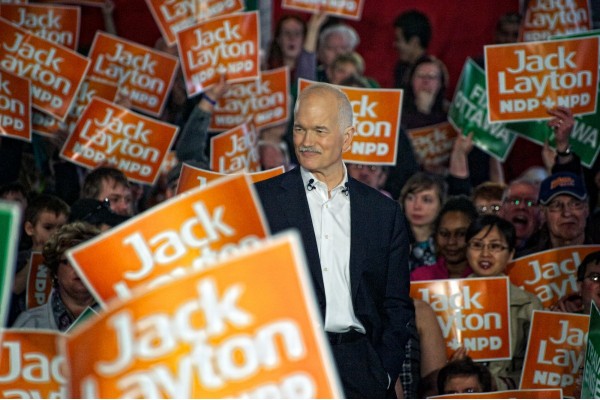Justin Trudeau’s status quo election
We’re back to another Liberal minority, and there isn’t much to celebrate

Justin Trudeau speaks during a Liberal Party election night event in Montréal, Québec, in the early hours of Tuesday, September 21, 2021. Still image from YouTube/Yahoo News.
According to the latest election results, the Liberals and the Conservatives have won the bulk of seats in what will be Canada’s 44th Parliament. Between the two, the Liberals came out the night’s biggest winner by securing a plurality of seats, marking what is now Justin Trudeau’s third consecutive victory as party leader.
For the many millions of Canadians frustrated by Liberal incompetence and repulsed by Conservative callousness, this election outcome is not a joyous one. How could it be, when both parties (in differing degrees, granted) are either ignoring the country’s most pressing issues, offering insufficient, piecemeal policies to address them, or are complicit in exacerbating them?
If you don’t believe me, take a look again at each party’s platform. Once you have read through them, ask yourself the following questions.
Did either the Liberals or the Conservatives offer the bold solutions necessary to improve working and middle-class prosperity? Or will their policies facilitate rampant income and wealth inequality by under-taxing the one percent and underfunding crucial health and social programs?
Did either pledge to right the many wrongs in Canada’s ‘imperial-lite’ foreign policy? Or are they both guilty of promoting policies that undermine Latin American democracy, funnel arms to human rights abusers, and allow foreign aid spending to dry up?
Did either provide the solutions necessary to tackle the opioid crisis? Or will it persist unabated, with both parties refusing to decriminalize the possession of illicit drugs?
Did either propose to substantially improve Canada’s worsening democratic deficit? Or did they both pledge to uphold the country’s outdated, unrepresentative first-past-the-post electoral system, while continuing the Liberal and Conservative tradition of centralizing prime ministerial power and making use of dense, unreadable omnibus bills?
If, after reading their platforms, you’ve come to the same conclusion as I have, you’ll agree that both the Liberals and the Conservatives proposed platforms that failed to sufficiently promote the interests of everyday Canadians. Instead of offering the progressive and transformational change this country needs, they promised more of the same and a continuation of the perpetually inequitable status quo.
Fortunately, though, there is some good news to be had from this mess of an election.
For starters, neither the Liberals nor the Conservatives succeeded in securing a majority government. Facing competition from all ends of the political spectrum, as well as from nationalists in la belle province, both of the major parties have found themselves electorally boxed in, unable to expand their big tents. That’s a good thing.
Secondly, Canadians took the opportunity to ensure greater accountability of their government by voting in (slightly) more progressive MPs—ones who will be well-positioned to push the Liberals into delivering the bold change this country needs.
The genuinely progressive MPs I am speaking about, are of course, from the NDP.
With their marginally increased seat count (and rise in the percentage of the vote) the NDP is in a stronger position to counter the Liberal-Conservative establishment than they were two years ago, which is deserved by the commendable way they conducted themselves this election.
Unlike the Greens, who, beset by party infighting, struggled to field a full set of candidates (and subsequently plummeted in the polls), Jagmeet Singh and his team ran a solid, unified campaign.
They also compiled a platform that, if implemented, would have significantly improved the lives of working-class Canadians.
With wide-ranging policy commitments to increase healthcare and housing funding, introduce a “universal, publicly funded national pharmacare and dental care program” and expand “income security programs to ensure everyone in Canada has access to a guaranteed livable basic income” the NDP presented a platform that would have been far more effective in improving socio-economic equality than anything proposed by the Liberals or the Conservatives.
To tackle wealth and income inequality, the NDP also proved superior to its establishment rivals, what with its pledges to increase the capital gains rate, boost corporate taxes and introduce a new wealth tax on the country’s most affluent.
And that’s not all.
In terms of foreign policy, the NDP broke from the Liberal-Conservative consensus by pledging to reinvest in international development assistance and suspend its arms sales to Israel.
Other miscellaneous commitments, like the one to improve and reform Canada’s electoral system by implementing mixed-member proportional representation, were similarly admirable and deserving of praise.
Of course, the NDP platform was not without its faults.
To say that their climate plan was short on details would be a massive understatement. And their foreign policy could have been far more explicit in condemning Canada’s undemocratic actions in Latin America and in curbing the environmental exploits and human rights abuses committed overseas by Canadian mining companies, among other social justice issues.
Nonetheless, the party’s platform contained far more positives than it did negatives and is undoubtedly more attractive than what was on offer by the establishment Liberals and Conservatives.
The election victory of the Liberals, and the undying loyalty of voters to the Conservative cause, leaves little room for enthusiasm among left-of-centre voters.
But like with anything, one has to find the silver linings that emerge from the darkness.
In this case, progressives can at least take some comfort knowing another NDP caucus is holding the balance of power in Ottawa—one which will hopefully be effective at representing working-class interests and holding the next government to account.
Wyatt James Schierman is a freelance writer from Alberta and a regular columnist with Loonie Politics. His writing has also been published in the Ottawa Citizen, the Toronto Star, the Calgary Herald, Huffington Post Canada and the Hill Times. When he is not writing, Wyatt is traveling abroad as an election observer.










